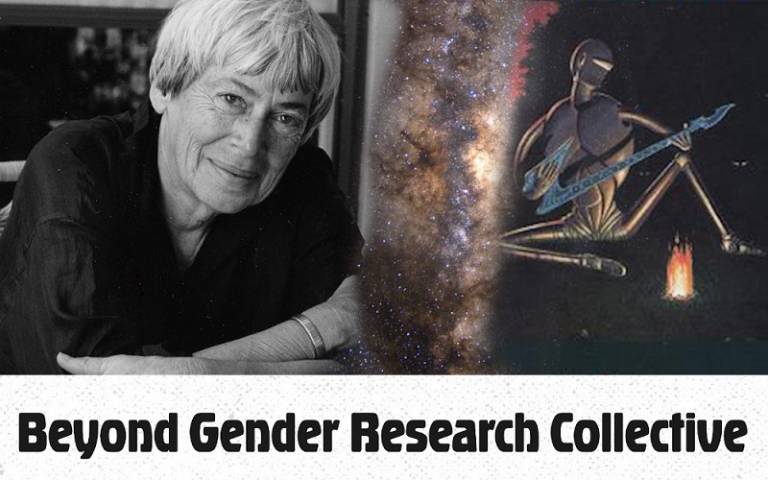VIRTUAL COSS talk: "Making a Beginning Together": Queer Storying in the Spacetime (Dis)Continuum
18 November 2021, 7:00 pm–8:30 pm

Beyond Gender will apply our method of collective close reading to investigate how Ursula Le Guin's novelette The Shobies Story uses the strange realities of outer space to experiment with new ways of thinking, writing and being together. This session will include creative writing exercises, a Beyond Gender roundtable and experiments in collective storytelling.
This event is free.
Event Information
Open to
- All
Availability
- Yes
Cost
- Free
Organiser
-
Centre for Outer Space Studies
This has been changed to a fully virtual event. Please register to receive the link to join online: https://coss-beyondgender.eventbrite.co.uk Please read our Virtual Events Code of Conduct.
At the beginning of Ursula K. Le Guin’s novelette ‘The Shobies’ Story’, we are introduced to a group of people from across the Ekumen, who have gathered together to test a new experimental instantaneous mode of space travel. We meet them in their ‘isyeye’, a Hainish word which we are told means “‘making a beginning together,’ or ‘beginning to be together,’” a period of time in which a number of individuals consciously and consensually coalesce to form a group (‘Shobies’’ 75). However, as they learn, the process of group formation is never truly over; it is always continually negotiated. Once they initiate the new method of space travel, the group cohesion dissolves as each individual experiences their environment differently. They must relate their varied experiences to each other in order to regain their group identity; partial, fragmentary, and contradictory as they are, these stories nevertheless create a narrative whole whereby they can construct their shared reality. The telling of stories, then, both performs and prefigures, bringing the world into being by enacting it through narrative. Finally, these various stories, like the narrative threads themselves, weave bonds of care between the individuals, remaking them as the Shobies.
Collective play and communal care, as modeled by the Shobies, this is how we approach being Beyond Gender— a research collective dedicated to explorations of queer, decolonial and feminist science fictions. Our own ‘isyeye’ (never complete, always in process), began in 2018 when a group of researchers and students met to discuss our shared joys and frustrations with sf and with sf studies. The group continues to grow. Though we have found in sf, in the words of our Beyond Gender Manifesto, “new worlds, forgotten ways of being, creatures whose strangeness show us the strangeness in ourselves […] We expect more. […] We believe that SF has an ethical obligation to disrupt the prevailing logics of the suffocating now, to instead envision and bring about emancipatory futures, futures which multiply, rather than reduce, our ways of being in (and beyond) the world(s)” (Beyond Gender 10). Shobies’ style, we meet, read, tell stories, write, play, and care for one another, acts that in themselves make and remake the world as in the best science fiction. And like the Shobies, a convergence of emotions, affects, individuals, the organic and the inorganic, we are what Jasbir K. Puar describes as a “queer assemblage”, which with “its espousal of what cannot be known, seen or heard, or has yet to be known, seen, or heard, allows for becoming/s beyond being/s” (128).
Beyond Gender is a research collective that investigates the radical potential of science fiction to subvert the gender binary. Our practice involves: collective reading, the playing of games, collaborative writing, and mutual care. For more information on our practice, papers, and publications, see our website: beyondgender.space
This event has been organised by the Centre for Outer Space Studies, part of the UCL Institute of Advanced Studies.
 Close
Close

